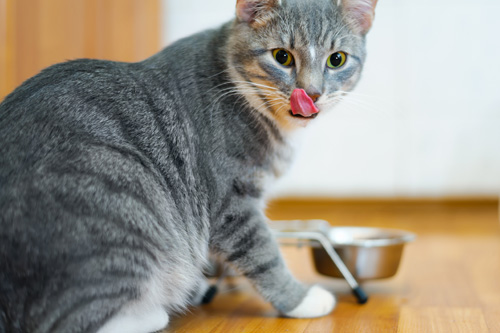Can Cats Eat Blueberries?
Doctor of Veterinary Medicine

While efforts are made to answer all questions as quickly as possible, if an immediate answer is required or if your pet is in need of urgent or emergency care, contact your pet's veterinarian immediately.
Doctor of Veterinary Medicine

You will receive an answer from Dr. Lindsay and our vet/tech team as soon as possible, usually the same day.
All answers are provided for informational or educational purposes only, and are intended to be a supplement to, and not a substitute for, the expertise and professional judgment of your pet's veterinarian.
It may be necessary to consult your pet's veterinarian regarding the applicability of any opinions or recommendations with respect to your pet's symptoms or medical condition.
CloseDoctor of Veterinary Medicine

An error has occurred, please reload the page and try again.
CloseWhile efforts are made to answer all questions as quickly as possible, if an immediate answer is required or if your pet is in need of urgent or emergency care, contact your pet's veterinarian immediately.
There is no answer related to your question

Has your favorite little carnivore been trying to get their paws on your blueberries? Blueberries are a sweet superfood for humans, but you may be surprised to learn that they are also packed with health benefits for cats.
Health Benefits Of Blueberries For Cats
Blueberries are packed with antioxidants like vitamin C, vitamin K and manganese. An antioxidant is a nutrient that helps reduce cell damage. A diet rich in antioxidants can help fight cancer, slow signs of aging, and otherwise help your cat live a longer, healthier life.
Did you know that blueberries are 85 percent water? They're perfect for helping to keep your cat hydrated, especially if their diet is primarily made up of dry kibble. Keeping your cat hydrated is the best way to prevent common feline diseases like kidney stones, urinary tract infections and chronic kidney disease.
Blueberries are also high in fiber. They can help keep your cat's digestive tract on the move, particularly if they are prone to hairballs. Fiber also helps your cat feel full, making blueberries useful for satisfying your cat's appetite if they need to lose weight.
What If My Cat Doesn't Like Blueberries?
Cats cannot taste sweetness, so they are not typically drawn to the berry's flavor. Some cats, however, seek out novelty flavors and textures, so they may still get excited about blueberries.
Though blueberries have some potential health benefits, they are not an essential part of your cat's diet. If your cat doesn't like them, there's no need to press the issue. Cats are carnivores, and most will not naturally seek out fruits and veggies.
How To Feed Your Cat Blueberries
Fresh or frozen blueberries are perfect for your cat. You may want to squish them down with a fork to keep your cat from rolling them around all over the floor. By squishing your cat's berries, you can release that juicy goodness to make them all the more tempting.
You can dip the blueberries in plain yogurt or kefir for an extra digestive boost. The probiotics in yogurt and kefir introduce immunity-supporting "good bacteria" into your cat's small intestine. At the same time, the fiber in the blueberries act as a prebiotic that actually feeds those gut-friendly bacteria. Talk about a snack with a one-two punch!
Though blueberries are pretty healthy, they should not make up a significant part of your cat's diet. Your cat needs a complete, balanced diet, whether that's canned food or dry kibble, or a vet-approved home cooked diet. Adding too many snacks can throw off that balance. If you discover that your cat loves blueberries, limit their intake to no more than 2-3 berries just a few times per week.
 Swipe
Swipe



























